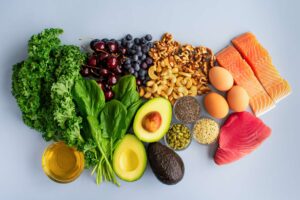Essential Nutritional Supplements For Women Post-Menstruation



Every woman’s health journey is unique, and maintaining optimal well-being involves a combination of a balanced diet, regular exercise, and adequate rest. Following menstruation, women may experience fluctuations in nutrient levels, making it crucial to pay attention to their nutritional needs.
In this blog post, we’ll explore essential nutritional supplements that can support women’s health, providing a foundation for overall well-being.
- Calcium and Vitamin D for Strong Bones: After menstruation, women need to focus on maintaining bone health. Calcium and vitamin D work in tandem to support bone density and strength. Calcium-rich foods include dairy products, leafy greens, and fortified foods. Vitamin D, which aids in calcium absorption, can be obtained from sunlight, fatty fish, and supplements if necessary.
- Iron to Combat Fatigue: Menstruation can lead to a temporary decrease in iron levels, potentially causing fatigue and weakness. Iron-rich foods such as red meat, poultry, fish, beans, and fortified cereals can help replenish iron stores. In some cases, iron supplements may be recommended under the guidance of a healthcare professional.
- Folate (Folic Acid) for Reproductive Health: Folate is crucial for reproductive health, especially in the post-menstrual phase. It plays a key role in preventing neural tube defects during pregnancy. Leafy greens, legumes, fortified cereals, and supplements for pregnant women are excellent sources of folate.
- Omega-3 Fatty Acids for Heart Health: Omega-3 fatty acids contribute to heart health and have anti-inflammatory properties. Including fatty fish like salmon and mackerel, as well as plant-based sources like flaxseeds and walnuts, can be beneficial. Omega-3 supplements may be considered, especially for those with limited dietary intake.
- Magnesium for Overall Wellness: Magnesium is essential for muscle function, energy production, and bone health. Nuts, seeds, whole grains, leafy greens, and legumes are excellent dietary sources. Magnesium supplements may be considered, particularly for individuals with insufficient intake or specific health concerns.
- Vitamin B12 for Energy and Nerve Function: Vitamin B12 is crucial for energy production and nerve function. While it is commonly found in animal products like meat, fish, and dairy, some women may need supplements, especially if following a vegetarian or vegan diet.
After menstruation, a woman’s body goes through various hormonal changes, and paying attention to nutritional needs is essential for overall health and well-being. While a balanced diet is the foundation, incorporating targeted nutritional supplements can help bridge any potential gaps.
However, it’s crucial to consult with a healthcare professional before adding supplements to your routine to ensure they align with your individual health requirements.







